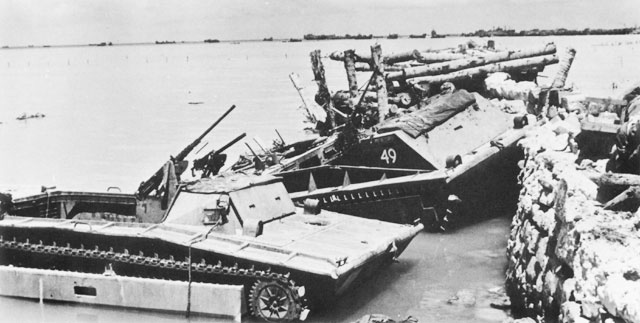In my last column I spoke of the impact of the US Navy’s visual communication style on the night fighting in the Solomons, and how it negatively impacted the “Black Shoe” surface ship officer’s ability to adapt to the radar and radio centered reality of night combat with the Imperial Japanese Navy. This column will explore how this communication style impacted the use of LVTs, or “Landing Vehicle Tracked” at Tarawa, and compare and contrast how that style interacted with how the US Army and US Marine Corps approached fighting with LVTs later in the Pacific War, and what it meant for the future.
THE BLOODLETTING
The assault on the island of Betio, in the Tarawa atoll, was the worst 76 hours of bloodletting in the history of the USMC. In the words of Colonel Joseph H. Alexander, USMC (Ret):
The final casualty figures for the 2d Marine Division in Operation Galvanic were 997 Marines and 30 sailors (organic medical personnel) dead; 88 Marines missing and presumed dead; and 2,233 Marines and 59 sailors wounded. Total casualties: 3,407. The Guadalcanal campaign had cost a comparable amount of Marine casualties over six months; Tarawa’s losses occurred in a period of 76 hours. Moreover, the ratio of killed to wounded at Tarawa was significantly high, reflecting the savagery of the fighting. The overall proportion of casualties among those Marines engaged in the assault was about 19 percent, a steep but “acceptable” price. But some battalions suffered much higher losses. The 2d Amphibian Tractor Battalion lost over half the command. The battalion also lost all but 35 of the 125 LVT’s employed at Betio.

The Marines lost roughly 333 men killed a day, or 13.25 men killed an hour for every hour for the assault at Betio. And for every man killed, two more fell wounded.
There were a number of reasons for this. The standard narrative speaks to inadequate naval fire support and bombing by the air forces of the Army and Navy, of Betio being surrounded by reefs that cut off the LCVP Higgins boats from the island, save at high tide, and a once in several decades “super neap tide” — where the combination of a strong solar perihelion tide, weak lunar apogean tide plus the expected last-quarter moon neap tide could combine for a no-tide period — that prevented the high tide from rising enough, thus forcing troops to cover hundreds of yards of machine gun and artillery swept shallows just to get to shore.

